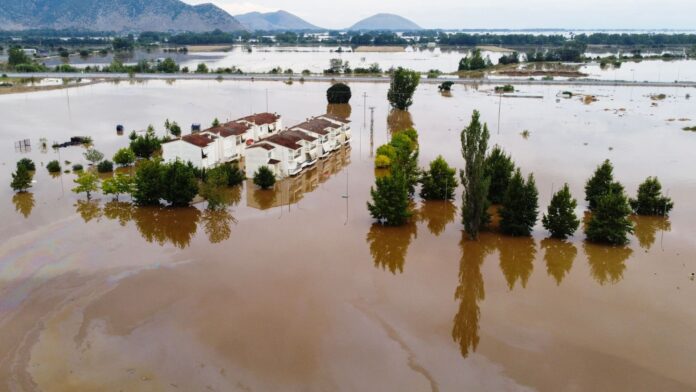An aerial view taken on September 7, 2023 shows the flooded village of Farkadona near the city of Karditsa, central Greece.
Will Vassilopoulos | Afp | Getty Images
The fight to secure a livable future for everyone on Earth requires much more urgent climate action — and only transformational changes will be enough to get back on track.
That was the sobering assessment from the technical dialogue of the United Nations’ first-ever “global stocktake,” a critically important process which looks at what countries have done to prevent a climate catastrophe.
The overarching synthesis report, published Friday, lays the foundation for the upcoming COP28 climate conference in the United Arab Emirates later this year.
Nearly 200 countries will meet in Dubai from Nov. 30 through to Dec. 12 to discuss how to use the U.N.’s technical findings to step up national measures.
Among its findings, the U.N. said that since the adoption of the landmark Paris Agreement in 2015, the accord had driven “near-universal climate action by setting goals and sending signals to the world regarding the urgency of responding to the climate crisis.”
“While action is proceeding, much more is needed now on all fronts,” the U.N. report said. “There is a rapidly closing window of opportunity to secure a liveable and sustainable future for all.”
The U.N.’s global stocktake was designed under the Paris Agreement as part of a global effort to accelerate climate action. The agreement said countries should take an inventory in 2023 to see how much progress had been made, and every five years after that. The current process is due to conclude at COP28.
The United Nations’ polite prose glosses over what is a truly damning report card for global climate efforts.
Ani Dasgupta
President and CEO of the World Resources Institute
As had been widely expected, the U.N. report confirmed the world is currently not on track to meet the long-term goals of the Paris Agreement.
The 2015 accord says that the long-term objective is to ensure global warming stays “well below” 2 degrees Celsius and to “pursue efforts” to limit the temperature rise to 1.5 degrees Celsius — the threshold at which scientists say would avoid the most severe and potentially irreversible climate impacts.
The world has already warmed by around 1.1 degrees Celsius, scientists say, after over a century of burning fossil fuels as well as unequal and unsustainable energy and land use. Indeed, it is this temperature increase that is fueling a series of mind-being extreme weather events around the world.
“The United Nations’ polite prose glosses over what is a truly damning report card for global climate efforts,” Ani Dasgupta, president and CEO of the non-profit World Resources Institute, said in a statement.
A traffic policeman wearing a face mask directs in heavy smog on in Harbin, Heilongjiang Province of China.
VCG | Getty Images
“Carbon emissions? Still climbing. Rich countries’ finance commitments? Delinquent. Adaptation support? Lagging woefully behind,” Dasgupta said.
“There are a few bright spots worth celebrating, such as the rapid uptake of renewable energy and electric vehicles in recent years. And numerous countries have rallied behind net-zero goals and passed important climate legislation,” they added.
“But overall, the report finds there are more gaps than progress — gaps that can only be erased by transformational change across systems like energy, food, land and transport.”
‘An acceleration exercise’
The U.N. said its findings showed that more research was needed on several so-called “information gaps.”
It said more information was required to better understand emissions scenarios if global average temperatures temporarily exceed and then return below 1.5 degrees Celsius, the extent to which carbon removal measures are needed and potential economic and non-economic loss and damage during a period of overshoot.
A man cools himself down with water from a water fountain during one of the hottest days of the third heat wave in Guadalajara, Jalisco state, Mexico, on June 12, 2023. (Photo by ULISES RUIZ / AFP) (Photo by ULISES RUIZ/AFP via Getty Images)
Ulises Ruiz | Afp | Getty Images
More research would also be required, the U.N. said, on which climate impacts are reversible and which are irreversible. This is particularly important, it added, to determine how to avoid and respond to tipping points. These are thresholds at which small changes can lead to dramatic shifts in Earth’s entire life support system.
The U.N. weather agency warned earlier this year that within the next five years, global average temperatures were likely to rise beyond 1.5 degrees Celsius above pre-industrial levels.
“The Stocktake offers countries preparing for COP28 in Dubai a clear inventory — not of failures — but of gaps and opportunities for governments, business and finance leaders to tackle together, in deeper systemic collaboration,” said Maria Mendiluce, CEO of the global non-profit We Mean Business Coalition.
Many are hoping for a paradigm shift at the COP28 talks, particularly after a U.N. meeting in June stalled over a lack of progress on issues such as climate finance and the pace of cuts in carbon pollution.
“Today’s global stocktake provides clear direction on how we can meet the expectations of the Paris Agreement by taking decisive action in this critical decade,” said Sultan al-Jaber, president of this year’s U.N. climate talks.
Al-Jaber, who is also the chief executive of UAE oil giant ADNOC, called on public and private sector leaders to come to COP28 “with real and actionable commitments to address climate change.”
U.N. Climate Change Executive Secretary Simon Stiell has previously described the global stocktake as “an ambition exercise,” “an accountability exercise” and “an acceleration exercise.”
“It’s an exercise that is intended to make sure every Party is holding up their end of the bargain, knows where they need to go next and how rapidly they need to move to fulfill the goals of the Paris Agreement,” Stiell said in November last year.


